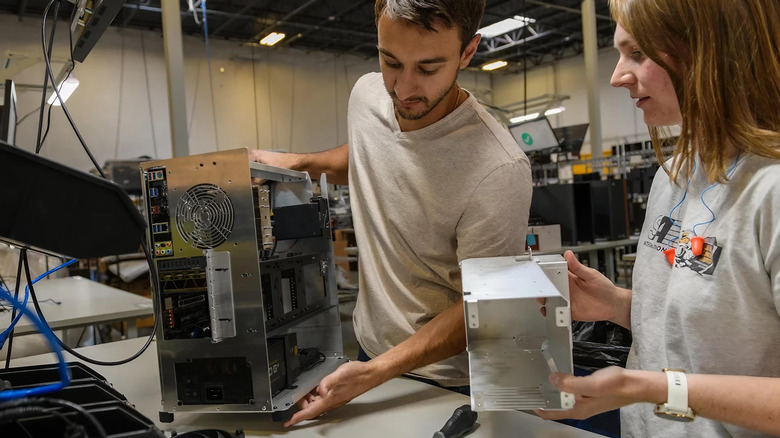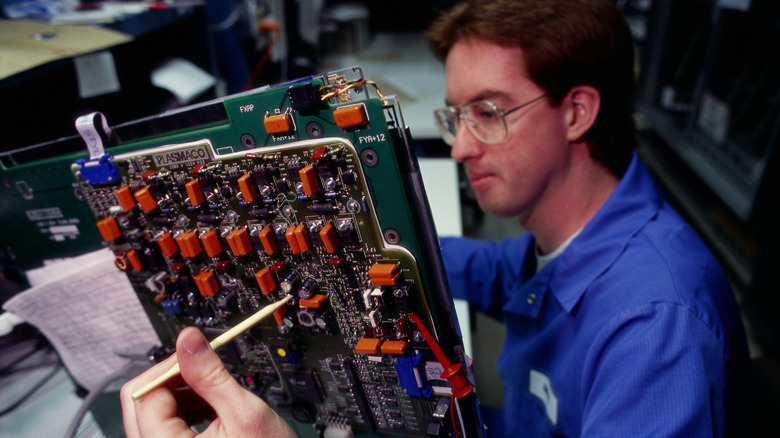These PC Brands Are Still Manufactured In America
While many PC components still come from overseas, a handful of companies are proud to assemble and produce desktops in the U.S. System76 perhaps takes the lead when it comes to U.S. manufacturing. Based in Denver, Colorado, this company designs, assembles, and manufactures a notable portion of its components domestically. Its Thelio desktops are a prime example and feature custom CNC-machined aluminum chassis crafted from U.S.-sourced materials. But it also produces laptops like the Serval WS locally. System76 says it also handles the powder coating, assembly, and testing locally.
MSI also has a notable manufacturing presence in the U.S. The company produces some of its Aegis and Codex desktops stateside to cater to the American market. PCMag, which spoke to one of the company representatives, notes that this allows it to ensure quicker turnaround times and better availability of parts when launching new products. Then there's Digital Storm that assembles custom gaming PCs in California. Meanwhile, Velocity Micro hand-assembles all of its PCs in Virginia, specializing in high-performance systems. Origin PC stands out, too, with all of its premium gaming rigs built in Florida — though its parent company Corsair announced in 2024 that this was being shifted to its Atlanta facility. Falcon Northwest and Supermicro also handle desktop and server assembly in Oregon and California, respectively.
Companies choose to manufacture in the U.S. not just for economic benefits but for a sense of national pride and community. Building locally allows them to uphold higher standards of labor, consumer rights, and product quality, while proximity to customers improves responsiveness and service. Unfortunately, despite efforts, all of the aforementioned companies still rely on imported parts for their internal components. Manufacturing a fully American-made machine is not feasible at the moment, given the current state of the global tech supply chain.
Is it possible to manufacture a PC completely in the U.S.?
As it stands, component production for things like processors, RAM, GPUs, and printed circuit boards is heavily concentrated in countries like Taiwan, South Korea, and China. Trying to build an American-made PC using only domestic components would be prohibitively expensive. In fact, most current U.S.-made PCs are designed for niche markets like gaming or professional workstations, where customers are willing to pay a premium for domestically assembled products. A prime example of this is the Apple Mac Pro, which was manufactured in Austin, Texas, from 2013 to 2019. This happened even as most of the company's other cheaper products like the MacBook were still manufactured overseas.
Labor costs are one of the primary challenges in bringing manufacturing stateside. American workers demand higher wages and better working conditions compared to their overseas counterparts, making it difficult to stay competitive on price. Sure, manufacturers can cut some costs by moving certain assembly processes back home. However, it's often hard to replicate the low-cost, high-volume manufacturing infrastructure that countries like China or Taiwan provide.
Moreover, challenges like energy reliability (as seen with the high power demands of semiconductor plants) and the difficulty of sourcing raw materials locally only add to the challenges. This dilemma isn't unique to PCs, as several headphone brands made in America face similar challenges. That said, the CHIPS and Science Act and rising pressures for reshoring could pave the way for increased semiconductor production in the U.S. This, in turn, might bring about a shift with other components in the future.

